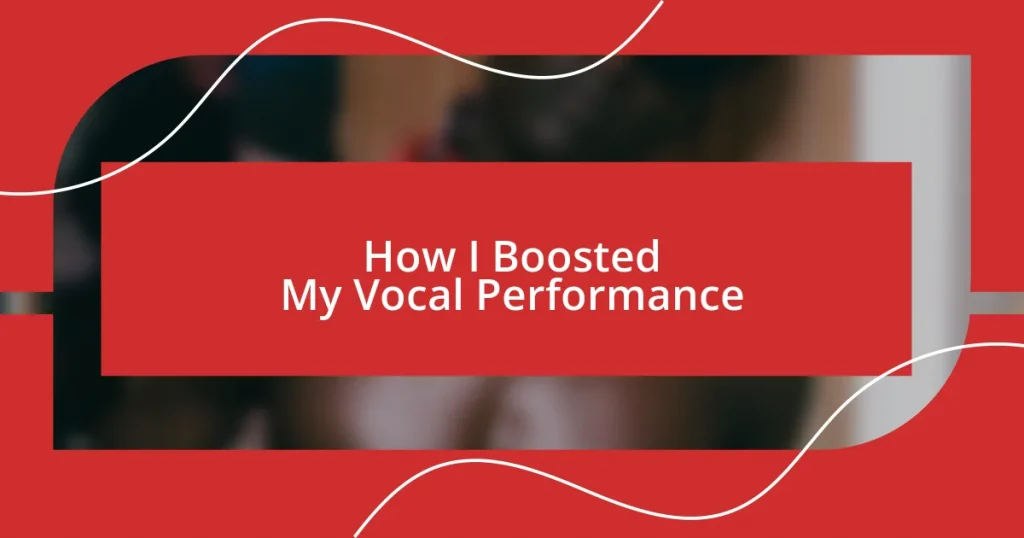Key takeaways:
- Identifying vocal strengths through self-reflection, recording sessions, and exploring various music genres helps unlock potential and expand artistry.
- Setting specific, measurable goals for vocal improvement along with regular feedback boosts confidence and tracks progress effectively.
- Seeking professional vocal coaching provides tailored techniques and accountability, enhancing vocal production and emotional delivery during performances.
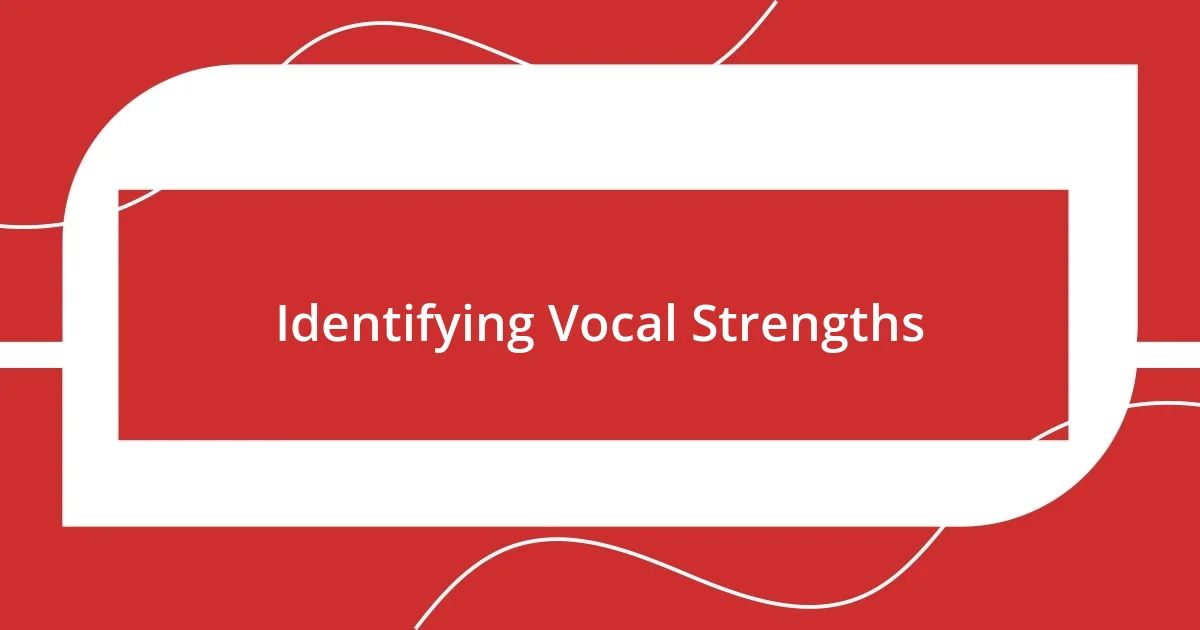
Identifying Vocal Strengths
One way I identified my vocal strengths was through consistent self-reflection and feedback. After countless singing sessions, I noticed that I shone in my lower register, where I felt both powerful and comfortable. Have you ever sung a note that just felt right? That blissful moment is what sparked my curiosity about my vocal potential.
In my journey, I found it incredibly valuable to record myself regularly. Listening back, I was able to pinpoint areas where my tone was especially resonant and expressive. There’s something eye-opening about hearing your voice from an outside perspective—it’s like discovering a hidden layer of your artistry. Have you tried recording yourself? You might be surprised by what you uncover!
Another powerful exercise was exploring various genres of music. I initially believed my strength lay in pop, but diving into jazz revealed the flexibility and richness of my voice. It felt like unveiling a different side of myself! Each style challenged me in new ways, allowing my strength to evolve. What genres resonate with you, and have you pushed your boundaries to see what strengths might emerge?
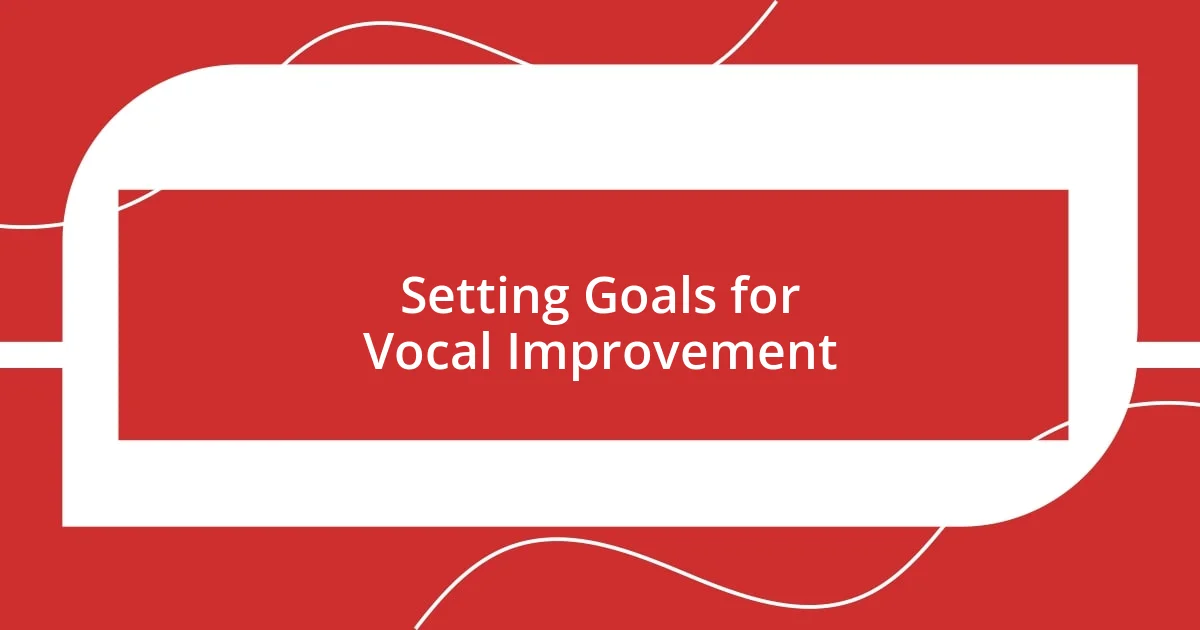
Setting Goals for Vocal Improvement
Setting goals for vocal improvement is essential to track your progress and maintain focus. I remember when I first set my sights on improving my vocal range. I decided to aim for reaching at least three notes higher than I usually felt comfortable singing. It felt daunting at first, but with each small achievement, my confidence grew, and I began to savor each challenge.
Here are some effective goal-setting strategies for vocal improvement:
- Identify Specific Weaknesses: Focus on particular areas, like breath control or pitch accuracy, rather than vague improvements.
- Set Measurable Goals: For example, aim to sing for 30 minutes daily, or hit a specific note correctly in a song within a month.
- Timeline for Goals: Establish deadlines to keep yourself accountable—for instance, mastering a new song by the end of the week.
- Celebrate Small Wins: Recognize and celebrate your progress, even if it’s just hitting a difficult note or completing a challenging warm-up.
- Seek Feedback Regularly: Share your progress with a trusted mentor or friend, ensuring you stay motivated and on the right track.
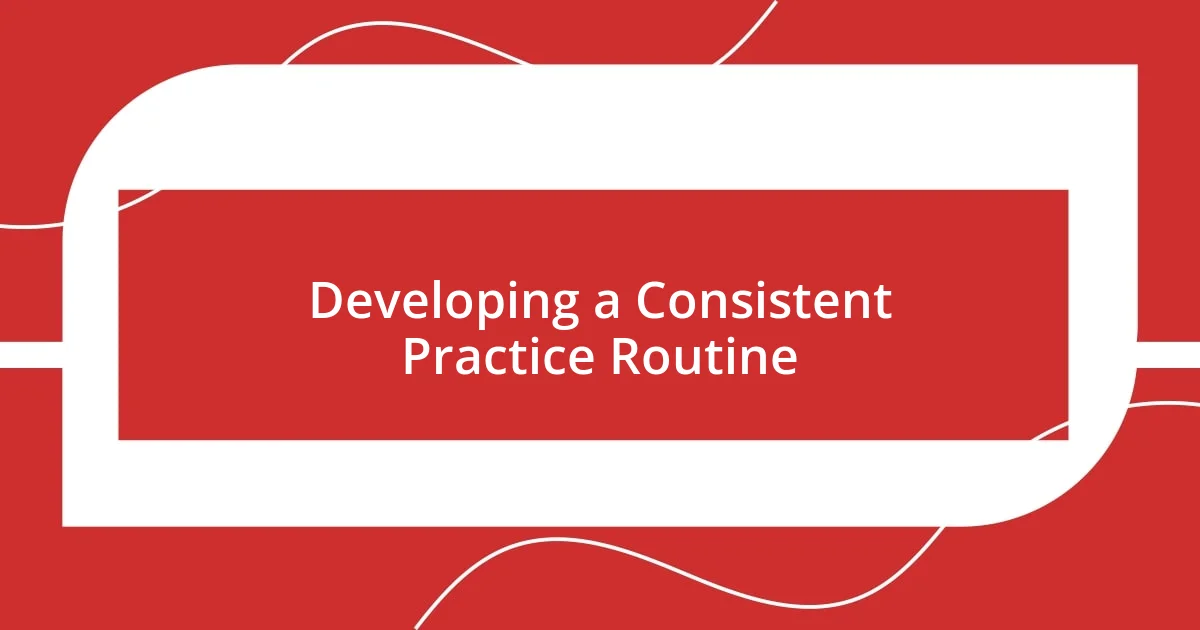
Developing a Consistent Practice Routine
To develop a consistent practice routine, I found that setting a specific time each day dedicated solely to vocal exercises made all the difference. Initially, I struggled to find the right time, often squeezing in practice between other activities. However, once I committed to practicing every morning before the world woke up, it became a cherished part of my day—like a secret ritual. What time works best for you?
I also discovered the power of variety in my practice sessions to keep things fresh. For instance, I would alternate between warm-ups focused on breath control one day and pitch exercises the next. Practicing in this way not only prevented burnout but also reinforced different aspects of my vocal technique. Have you ever felt the thrill of mixing things up and seeing where your voice can take you?
As I monitored my progress, I integrated a journaling component into my routine. After every session, I’d jot down my feelings, breakthroughs, and even moments of frustration. This reflective practice deepened my understanding of my voice and its evolution. By capturing those raw emotions, I felt more connected to my art, sparking even greater passion for improvement. What do you think could enhance your own self-reflection on progress?
| Practice Routine Elements | Personal Reflection |
|---|---|
| Consistent Timing | Daily morning sessions transformed my practice into a valuable routine. |
| Variety of Exercises | Alternate focus each day to prevent burnout and strengthen different skills. |
| Journaling Progress | Writing about my sessions heightened my connection to my voice. |
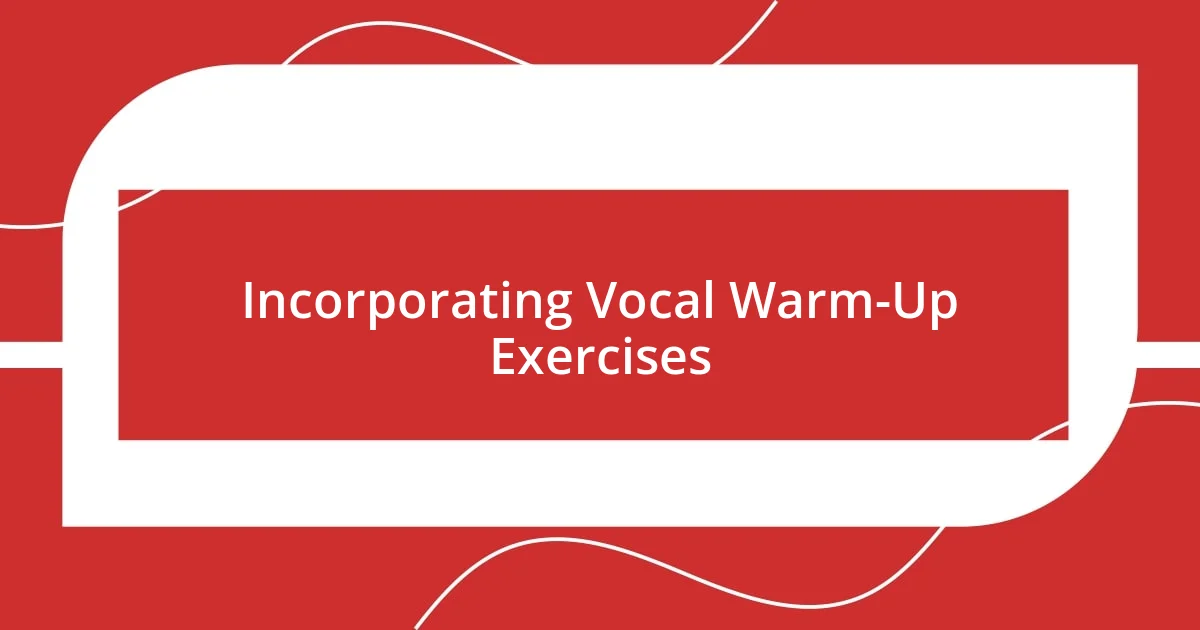
Incorporating Vocal Warm-Up Exercises
Incorporating vocal warm-up exercises into my routine was a game-changer. I started with simple lip trills and humming, which not only warmed up my voice but also relaxed me mentally. I often found myself smiling during these exercises—did you know that engaging physically can shift your mindset?
One day, I dedicated time to work on scaling my voice using sirens, which are a gentle way to navigate through pitches. As I glided up and down, I felt my vocal cords stretching and releasing tension. It was exhilarating! Over time, I noticed how much my confidence grew when approaching higher notes during performances. Have you experienced that “aha” moment where your warm-ups directly translate to your singing?
Now, I always include breathing exercises as part of my vocal warm-up. Focusing on deep diaphragmatic breathing changed everything for me—it grounded my voice. I still remember the first time I applied these techniques in a challenging song; it felt like the notes were flowing through me effortlessly. How do you feel when you connect breath with vocal expression? Trust me, it can elevate your performance.
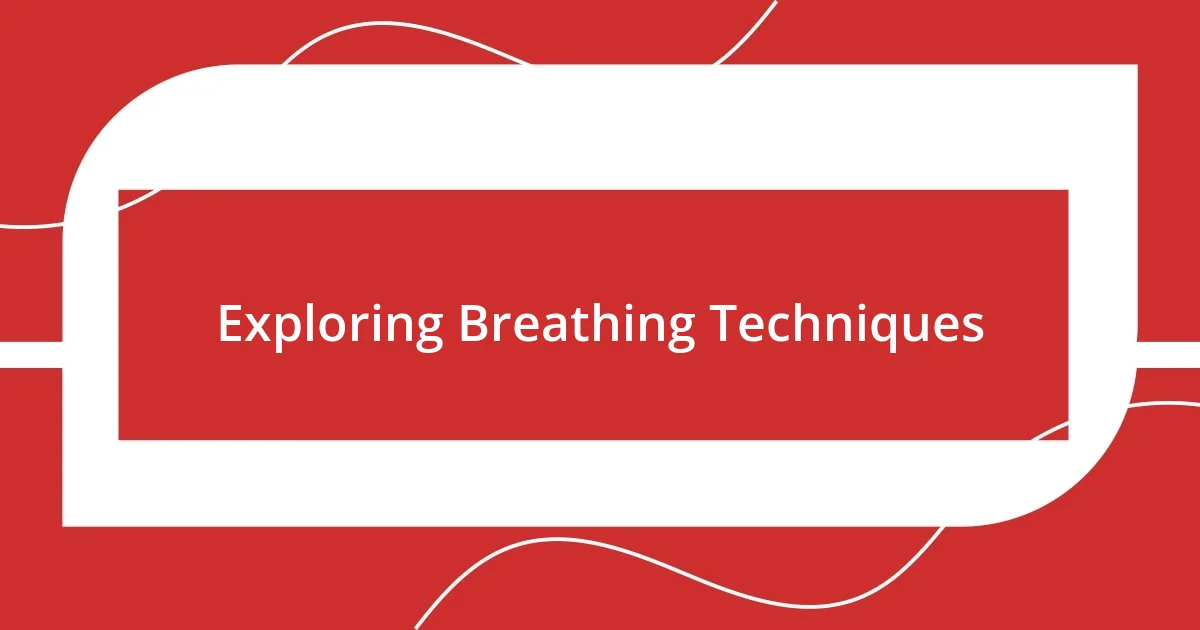
Exploring Breathing Techniques
Breathing techniques have played a crucial role in my vocal journey. I once struggled with breath control during long phrases, often feeling like I was running out of steam mid-song. It was during a vocal workshop that I learned the importance of abdominal breathing—engaging my diaphragm allowed me to access more air without straining my throat. Isn’t it fascinating how something as simple as breathing can make such a profound difference in how we sing?
I recall a particularly challenging performance where I felt nervous. Instead of letting my anxiety take over, I practiced inhaling deeply for four counts and exhaling slowly for eight. This technique not only calmed my jitters but also provided a steady airflow that helped me hit those high notes with clarity. Have you ever noticed how your breathing affects your confidence on stage? I can assure you, mastering your breath can give you a sense of control that feels empowering.
There was a time I experimented with different breathing exercises, like the “hissing” exercise where you take a deep breath and release it slowly while making a hissing sound. I found it incredibly fun and, more importantly, effective for building breath support. As I watched my ability to extend those hisses grow longer and more stable, I felt a rush of satisfaction—it was like unlocking a new level in my vocal skillset. What breathing techniques have you tried, and how have they affected your singing experience?
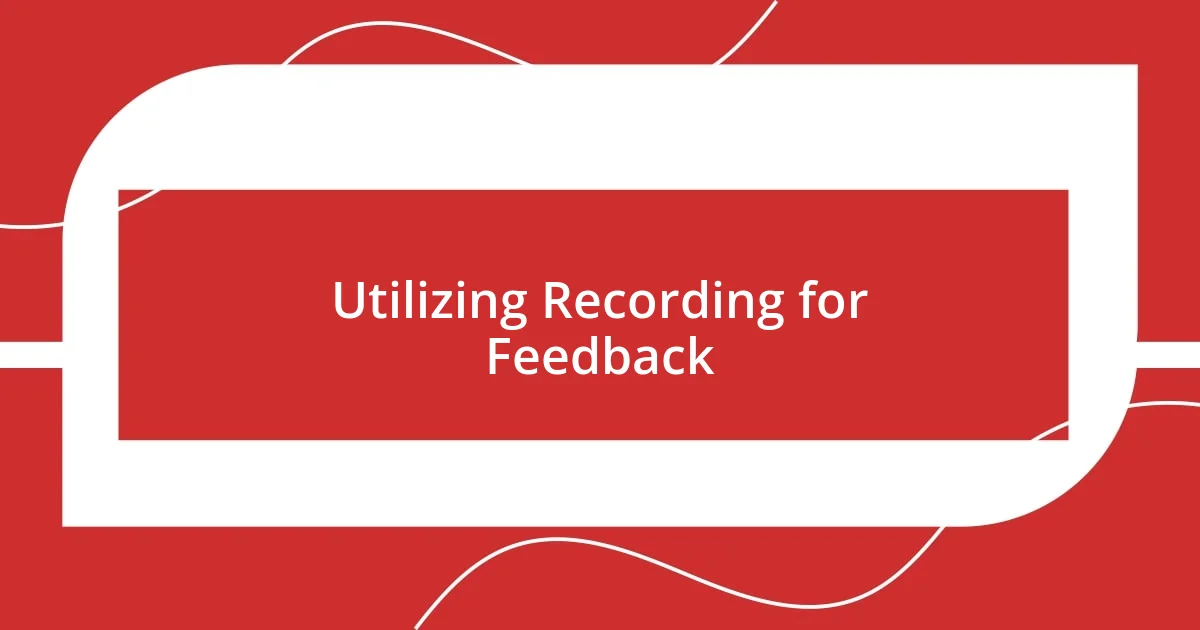
Utilizing Recording for Feedback
Recording my singing sessions has been an eye-opening experience. Initially, I was hesitant to listen to my own voice on playback; it felt strange and somewhat uncomfortable. However, I quickly realized that capturing my performances allowed me to hear the nuances I often missed in real-time. Have you ever listened to a recording of yourself and thought, “Is that really how I sound?” It’s humbling but crucial for growth.
After each recording, I would take notes on what I liked and what I wanted to improve. I remember feeling a surge of motivation after identifying specific areas, like pitch stability or breath support, that I could work on. It was empowering to hear my progress over time. Sometimes, I even used recordings to set mini-goals for myself. Just the other day, I focused on a piece where I initially struggled, and listening to my earlier takes ignited a desire to conquer that challenge—it was like having my own personal coach in my ear. Have you set vocal goals based on feedback from your recordings?
What surprised me the most was how fragmented performances felt to me compared to what I heard when I played back the audio. I learned the importance of pacing, dynamics, and emotional expression through this process. One evening, after recording a particularly passionate rendition of a song, I felt exhilarated yet vulnerable as I listened to it. That moment reinforced my understanding that every note is an opportunity for connection; it became a personal journey of vulnerability and strength. How has capturing your singing changed your perspective on performance?
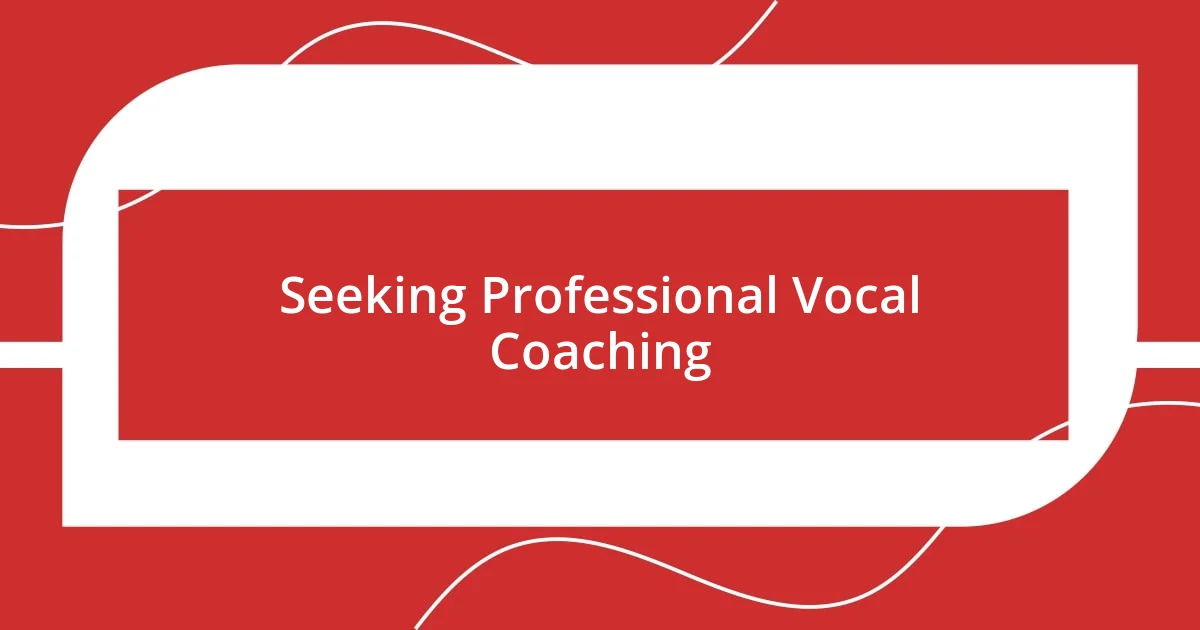
Seeking Professional Vocal Coaching
Seeking professional vocal coaching can be a transformative experience. I distinctly remember the first vocal coach I worked with. Walking into her studio, I was struck by the warmth of her welcome and the enthusiasm in her eyes. We dove right into techniques and exercises that felt tailored to my unique challenges. It was eye-opening to have someone with expertise analyze my voice and guide me through the intricacies of vocal production. Have you ever felt like you’ve been missing something in your singing? That’s exactly how I felt before coaching.
One lesson that really stands out was when my coach introduced me to the concept of resonance. She described it as the voice’s ability to ‘ring’ or project beyond the vocal cords themselves. I remember standing in front of her, singing scales while she had me place my hand on my chest, feeling the vibrations. That moment was a revelation—I could literally feel my voice changing! It was the first time I understood how resonance could enhance my vocal presence. I often wonder how many singers bypass this crucial understanding, relying solely on technique without exploring the full potential of their instrument.
Another significant aspect of working with a vocal coach is the accountability factor. With each lesson, I felt a newfound commitment to my practice. I recall one week when I had a big performance coming up, and my coach pushed me to refine my emotional delivery. It was tough, but when I got on stage, I could channel the emotion I had worked so hard to capture. Have you ever had that feeling of knowing you could conquer a challenge because of preparation? For me, it was like stepping into a new version of myself, confident and ready to share my story through song.










